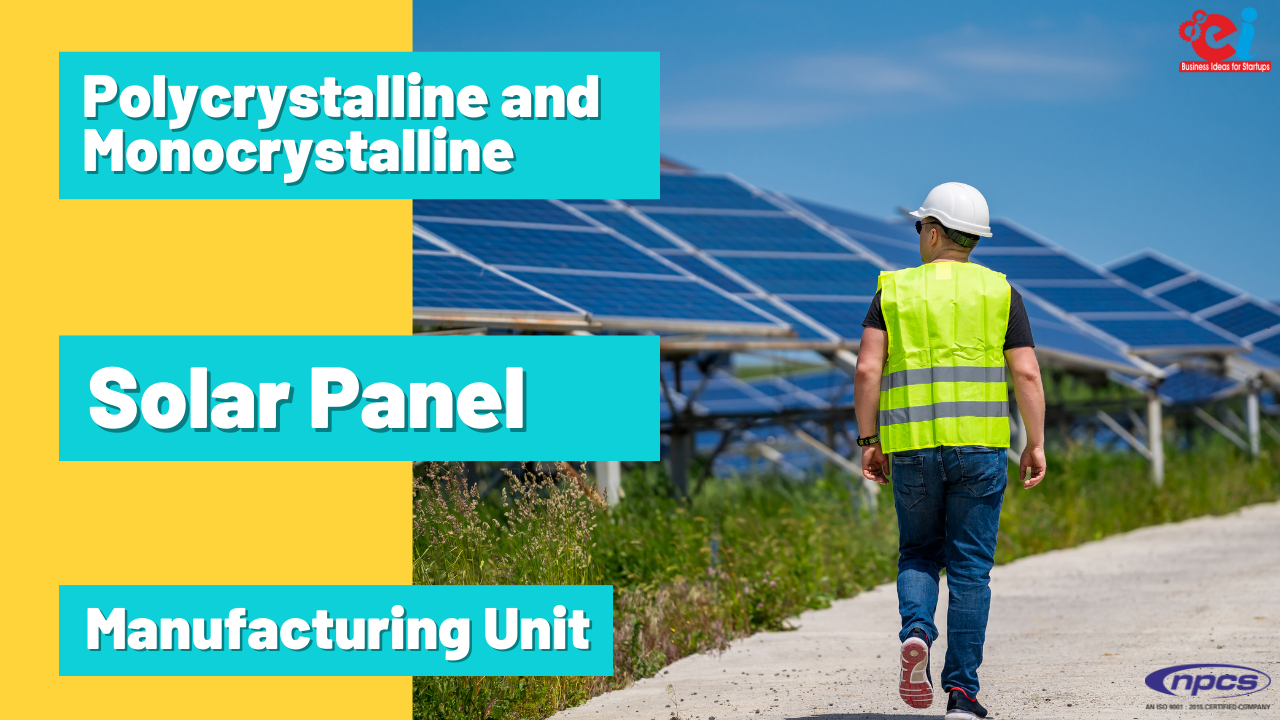Starting a Polycrystalline and Monocrystalline Solar Panel manufacturing unit is a high-potential venture in today’s renewable energy-driven economy. With governments around the world pushing for clean energy adoption and solar power leading the way, investing in the production of solar panels can bring long-term profits, sustainability benefits, and national-level contribution to the green energy movement. These two types of panels—polycrystalline and monocrystalline—are currently the most widely used in residential, commercial, and industrial solar projects. A dedicated manufacturing unit for both allows you to tap into a broad client base with diverse efficiency and budget requirements.
Understanding the Market Potential
The global demand for Polycrystalline and Monocrystalline Solar Panel solutions continues to grow rapidly, driven by climate change policies, net-zero goals, and rising electricity prices. In India, the solar sector is one of the fastest-growing industries with government initiatives like PM-KUSUM, Solar Rooftop Yojana, and Make in India driving large-scale solar adoption. International markets, especially in Europe, Africa, and Southeast Asia, are also importing solar panels in huge volumes due to growing clean energy demand.
Establishing a Polycrystalline and Monocrystalline Solar Panel manufacturing unit today means you’re entering a future-proof business with scalable market demand. These solar panels are not just powering homes—they are being used in schools, hospitals, offices, farms, and infrastructure projects, with policy support for local production and subsidies enhancing the investment opportunity.
Visit this Page for More Information: Start a Business in Renewable Energy Industry
Differences Between Polycrystalline and Monocrystalline Panels
Before setting up a Polycrystalline and Monocrystalline Solar Panel unit, it’s important to understand the technical and market differences. Monocrystalline panels are made from single-crystal silicon and offer higher efficiency, longer lifespan, and better performance in low light. They are preferred in urban and high-performance projects where space is limited.
On the other hand, polycrystalline panels are made from melted silicon fragments, resulting in slightly lower efficiency but a more cost-effective manufacturing process. They are ideal for large, budget-conscious installations such as agricultural, industrial, or rural electrification projects. Having both product lines in your facility ensures you cater to all segments—from premium to mass-market customers.
Related Feasibility Study Reports: Renewable Energy Sector, Green Power, Solar Energy, Biofuel, Hydroelectric, Wind, Geothermal, Biomass, Non-conventional Energy, New and Renewable Energy Projects
Manufacturing Process and Plant Setup
Setting up a Polycrystalline and Monocrystalline Solar Panel manufacturing unit involves several key stages. The process begins with sourcing high-purity silicon, followed by ingot casting, wafer slicing, cell fabrication, panel assembly, lamination, and quality testing. Specialized machinery is required for each stage, including:
-
Crystal growth and wafer cutting machines
-
Diffusion furnaces for doping
-
Anti-reflective coating chambers
-
Automated stringers and tabbers for assembling cells
-
Laminators, framing machines, and EL testers for final panels
A standard mid-scale plant can start with a capacity of 25–50 MW per annum, with a modular design allowing upgrades. You’ll need 15,000–30,000 sq. ft. of covered area, cleanroom sections for cell assembly, and adequate power supply to support continuous operations. Setting up your Polycrystalline and Monocrystalline Solar Panel unit close to industrial clusters or solar parks ensures better supply chain connectivity and logistics efficiency.
Read our Books Here: Environmentally Friendly, Eco-Friendly Products, Natural Products, Biodegradable Plastics, Natural Dyes and Pigments, Jute Products, Natural Fibers
Required Investment and Cost Structure
Initial investment for a Polycrystalline and Monocrystalline Solar Panel unit depends on scale and automation level. For a 25 MW capacity plant, you can expect to invest ?12–18 crore. Major cost components include:
-
Machinery and equipment: 45%
-
Raw materials and silicon wafers: 30%
-
Infrastructure and utilities: 10%
-
Labor and staff: 5%
-
Testing, R&D, certifications, and miscellaneous: 10%
Raw material prices, especially silicon, glass, and EVA sheets, fluctuate with global markets, so efficient procurement and inventory planning are crucial. Government schemes offer capital subsidies and reduced duties on imported machinery, reducing your upfront financial burden.
Read Similar Articles: Renewable Energy
Regulatory Requirements and Certifications
To manufacture and sell Polycrystalline and Monocrystalline Solar Panel products in India or abroad, certain certifications and registrations are necessary. These include:
-
BIS Certification (Compulsory for all solar panels in India)
-
IEC 61215, IEC 61730, and IEC 61853 series for international export
-
ALMM registration (Approved List of Models and Manufacturers for Indian tenders)
-
Factory License and Pollution NOC
-
GST registration and MSME Udyam registration
-
Fire safety and power load permissions
Following these regulations ensures your plant remains legally compliant and qualifies for government-backed tenders and subsidies. Export-focused units can also benefit from SEZ or EPCG schemes.
Business Plan: Solar Panel (both type of the PV Cells: Polycrystalline and Monocrystalline)
Sales Strategy and Distribution
A strong distribution strategy is essential for success in the Polycrystalline and Monocrystalline Solar Panel business. You can sell your products through the following channels:
-
Direct supply to EPC contractors handling solar projects
-
Wholesale to solar product dealers and distributors
-
OEM partnerships with inverter or battery companies
-
Online B2B platforms and government e-marketplaces (GeM)
-
Export orders via international agents or trade expos
Building a reliable dealer network in both urban and rural areas ensures regular order inflow. Offering product customization, warranty, installation support, and after-sales service enhances brand loyalty. Partnering with state electricity boards and rural electrification programs can generate bulk sales opportunities.
Business Opportunities and Profitability
The profitability of a Polycrystalline and Monocrystalline Solar Panel manufacturing unit is influenced by scale, raw material sourcing, and quality consistency. With economies of scale, the cost per panel can be significantly reduced while keeping the selling price competitive.
Profit margins typically range from 15% to 25% for large orders and up to 30% for retail sales or high-efficiency modules. With India’s solar energy target of 500 GW by 2030 and a rising push for domestic manufacturing, this industry offers long-term profitability, export potential, and recurring income from AMC or service contracts.
Future Scope and Expansion
The demand for Polycrystalline and Monocrystalline Solar Panel systems is set to multiply in the coming decade. Floating solar, rooftop installations, EV charging infrastructure, and agricultural solar pumps will all require quality panel supply. Manufacturers with an early start and strong quality control systems will be better positioned to expand into downstream solar components like inverters, batteries, or complete solar kits.
Additionally, technological innovation like bifacial modules, half-cut cells, and PERC (Passivated Emitter Rear Contact) cells can further differentiate your product offering. Creating in-house R&D labs and collaborating with engineering colleges or clean tech incubators ensures you stay ahead in performance and design.
Conclusion
Launching a Polycrystalline and Monocrystalline Solar Panel manufacturing unit is a powerful business move in a world heading toward sustainable energy. With India’s booming solar market and increasing global demand, this manufacturing business offers an ideal combination of economic gain and environmental impact. Entrepreneurs who are technically prepare, policy-aware, and quality-focused can build a resilient and scalable brand in the solar energy sector.
From residential rooftops to utility-scale power plants, solar panels are lighting up the future—and your business could be a major part of that transformation.
Watch other Informative Videos: Renewable Energy Sector, Green Power, Solar Energy, Biofuel, Hydroelectric, Wind, Non-conventional Energy, New and Renewable Energy
See More Links:
- Start a Business in Asia
- Start a Business in Potential Countries for Doing Business
- Best Industry for Doing Business
- Business Ideas with Low, Medium & High Investment
- Looking for Most Demandable Business Ideas for Startups
- Startup Consulting Services
- Start a Business in Africa
- Start a Business in India
- Start a Business in Middle East
- Related Videos
- Related Books
- Related Projects
NIIR PROJECT CONSULTANCY SERVICES, DELHI
An ISO 9001:2015 Company
ENTREPRENEUR INDIA
106-E, Kamla Nagar, Opp. Mall ST,
New Delhi-110007, India.
Email: npcs.ei@gmail.com
Tel: +91-11-23843955, 23845654, 23845886
Mobile: +91-9097075054, 8800733955
Website: https://www.entrepreneurindia.co
https://www.niir.org






